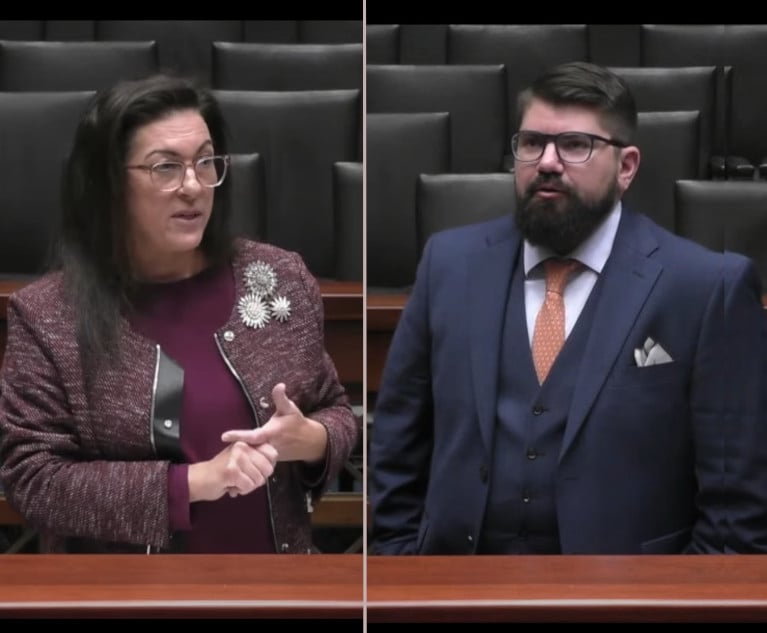Pepper Hamilton Might Face Sanctions for Discovery Fiasco in Baylor Sex Assault Case
“This violation has caused three months of delay in a case that has already been pending for three years and forced the parties to revisit issues that should have been resolved two years ago," the court wrote.
June 10, 2019 at 05:44 PM
5 minute read
 Photo: Bigstock
Photo: Bigstock
Big Law firm Pepper Hamilton might face sanctions at a hearing next week for violating a court order by withholding records that U.S. District Judge Robert Pitman had ordered the firm to disclose to plaintiffs suing Baylor University in Waco.
The records trace back to 2015 when Pepper Hamilton represented Baylor in an investigation about how the school inadequately responded to sexual assault allegations by students.
Plaintiffs in Doe v. Baylor University requested the firm's records in discovery in their Title IX lawsuit that alleges the university ignored their sexual assault allegations as students and created an environment on campus that allowed future sexual attacks to continue. Their lawsuit came after Pepper Hamilton's 2016 report found administrators responded inadequately to female students' allegations that Baylor football players sexually assaulted them.
Most recently in the discovery fiasco, Pitman, who presides in the U.S. District Court for the Western District of Texas in Waco, ordered Pepper Hamilton to produce everything responsive to discover requests that Baylor does not have, or anything Baylor has not yet disclosed. The plaintiffs asked for those records back in March 2017.
However, by the April 11 deadline, Pepper Hamilton certified that the firm didn't have any materials that Baylor doesn't also possess, said the court's June 7 order. The firm asked the court to reconsider or clarify the order for documents that Baylor had not yet disclosed, and raised three brand-new “untimely objections” to complying with discovery. The law firm now claims it shouldn't have to release records that Baylor logged as privilege, anything dated after June 15, 2016, and records related to three “separate” legal matters that the firm worked on for Baylor.
Pitman wrote that by not raising these objections sooner, Pepper Hamilton waived the opportunity to object. It also seems that the firm is trying to create delay.
Pitman wrote that he's inclined to sanction Pepper Hamilton for multiple discovery abuses over two years, including violating the court order.
“This violation has caused three months of delay in a case that has already been pending for three years and forced the parties to revisit issues that should have been resolved two years ago when the subpoena was first issued. This conduct increases costs for all parties and wastes public resources that are meant for adjudicating good faith disputes,” Pitman wrote.
But the court will give the firm a chance at a June 17 hearing to show good cause that it shouldn't face sanctions.
Pitman wrote that he has continuing concerns about Baylor's compliance with discovery orders.
Baylor had certified in September 2018 that it had completed production, but then in April, Pepper Hamilton told the court that Baylor had discovered a few hundred more documents. The plaintiffs informed the court that since then, the university has given up more than 3,500 new documents.
“Neither Baylor nor Pepper Hamilton have adequately explained when, how or why these documents were suddenly discovered,” the court wrote. “The record suggests that Baylor may have withheld court-ordered production.”
The court ordered Baylor at the hearing to address the court's concerns that it should have disclosed the other matters that Pepper Hamilton worked on back in 2017, and that it keeps making “eleventh-hour” disclosures, making the case longer, more burdensome and expensive.
The court noted that it typically defers to a party's privilege log, but that Baylor has had “repeated late discovery of material” and the court previously rejected some of Baylor's claimed privileges. The court ordered the parties to a June 17 hearing to sort out the privilege issue, and also decided to “adopt a claw back procedure” for certain materials. Pepper Hamilton must give up everything that the court ordered it to disclose following the hearing.
“All the firm would be required to do is produce materials directly to plaintiffs, without any review or log. Baylor would bear the burden of reviewing the materials afterwards and completing a privilege log,” the order said. “Plaintiffs will scan and Bates label the materials and produce them to Baylor within five days. Baylor will have two weeks to notify plaintiffs which documents Baylor contends are privileged.”
Dunnam & Dunnam partner Jim Dunnam of Waco, who represents the plaintiffs, declined to comment.
Thompson & Horton partner Lisa Ann Brown of Houston, who represents Baylor, and Cobb Martinez Woodward partner William Cobb Jr., who represents Pepper Hamilton, each didn't return a call seeking comment before deadline. Baylor spokesman Jason Cook declined to comment.
Read the 37-page order.
Related stories:
Judge Orders Pepper Hamilton to Produce Baylor University Sex Assault Records
Bench Slap for Lawyers Criticizing Opposing Counsel in Baylor University Sex Assault Case
This content has been archived. It is available through our partners, LexisNexis® and Bloomberg Law.
To view this content, please continue to their sites.
Not a Lexis Subscriber?
Subscribe Now
Not a Bloomberg Law Subscriber?
Subscribe Now
NOT FOR REPRINT
© 2025 ALM Global, LLC, All Rights Reserved. Request academic re-use from www.copyright.com. All other uses, submit a request to [email protected]. For more information visit Asset & Logo Licensing.
You Might Like
View All

How Uncertainty in College Athletics Compensation Could Drive Lawsuits in 2025

'It's Like They Lynched You:' Law Professor's Discrimination Claim Reaches High Court
7 minute read
Uvalde Shooting 'Fresh in Everyone's Mind:' Lone Dissenting Judge Disagrees with School's Disciplinary Decision Over Pellet Gun
Trending Stories
- 1DOJ Files Antitrust Suit to Block Amex GBT's Acquisition of Competitor
- 2K&L Gates Sheds Space, but Will Stay in Flagship Pittsburgh Office After Lease Renewal
- 3US Soccer Monopoly Trial Set to Kick Off in Brooklyn Federal Court
- 4NY AG James Targets Crypto Fraud Which Allegedly Ensnared Victims With Fake Jobs
- 5The 'Motherhood Advantage' in Law: Time to Flip the Script
Who Got The Work
Michael G. Bongiorno, Andrew Scott Dulberg and Elizabeth E. Driscoll from Wilmer Cutler Pickering Hale and Dorr have stepped in to represent Symbotic Inc., an A.I.-enabled technology platform that focuses on increasing supply chain efficiency, and other defendants in a pending shareholder derivative lawsuit. The case, filed Oct. 2 in Massachusetts District Court by the Brown Law Firm on behalf of Stephen Austen, accuses certain officers and directors of misleading investors in regard to Symbotic's potential for margin growth by failing to disclose that the company was not equipped to timely deploy its systems or manage expenses through project delays. The case, assigned to U.S. District Judge Nathaniel M. Gorton, is 1:24-cv-12522, Austen v. Cohen et al.
Who Got The Work
Edmund Polubinski and Marie Killmond of Davis Polk & Wardwell have entered appearances for data platform software development company MongoDB and other defendants in a pending shareholder derivative lawsuit. The action, filed Oct. 7 in New York Southern District Court by the Brown Law Firm, accuses the company's directors and/or officers of falsely expressing confidence in the company’s restructuring of its sales incentive plan and downplaying the severity of decreases in its upfront commitments. The case is 1:24-cv-07594, Roy v. Ittycheria et al.
Who Got The Work
Amy O. Bruchs and Kurt F. Ellison of Michael Best & Friedrich have entered appearances for Epic Systems Corp. in a pending employment discrimination lawsuit. The suit was filed Sept. 7 in Wisconsin Western District Court by Levine Eisberner LLC and Siri & Glimstad on behalf of a project manager who claims that he was wrongfully terminated after applying for a religious exemption to the defendant's COVID-19 vaccine mandate. The case, assigned to U.S. Magistrate Judge Anita Marie Boor, is 3:24-cv-00630, Secker, Nathan v. Epic Systems Corporation.
Who Got The Work
David X. Sullivan, Thomas J. Finn and Gregory A. Hall from McCarter & English have entered appearances for Sunrun Installation Services in a pending civil rights lawsuit. The complaint was filed Sept. 4 in Connecticut District Court by attorney Robert M. Berke on behalf of former employee George Edward Steins, who was arrested and charged with employing an unregistered home improvement salesperson. The complaint alleges that had Sunrun informed the Connecticut Department of Consumer Protection that the plaintiff's employment had ended in 2017 and that he no longer held Sunrun's home improvement contractor license, he would not have been hit with charges, which were dismissed in May 2024. The case, assigned to U.S. District Judge Jeffrey A. Meyer, is 3:24-cv-01423, Steins v. Sunrun, Inc. et al.
Who Got The Work
Greenberg Traurig shareholder Joshua L. Raskin has entered an appearance for boohoo.com UK Ltd. in a pending patent infringement lawsuit. The suit, filed Sept. 3 in Texas Eastern District Court by Rozier Hardt McDonough on behalf of Alto Dynamics, asserts five patents related to an online shopping platform. The case, assigned to U.S. District Judge Rodney Gilstrap, is 2:24-cv-00719, Alto Dynamics, LLC v. boohoo.com UK Limited.
Featured Firms
Law Offices of Gary Martin Hays & Associates, P.C.
(470) 294-1674
Law Offices of Mark E. Salomone
(857) 444-6468
Smith & Hassler
(713) 739-1250






